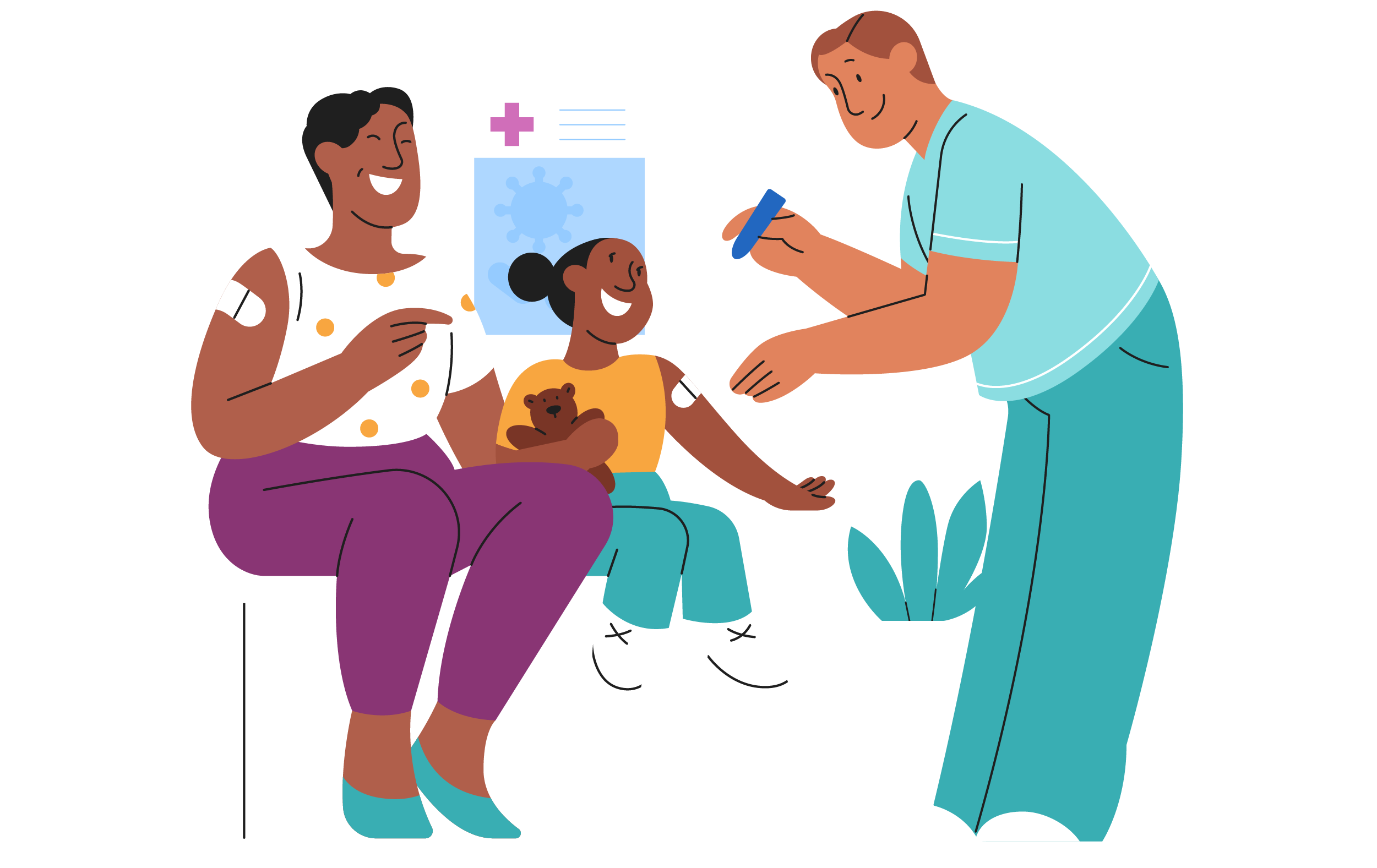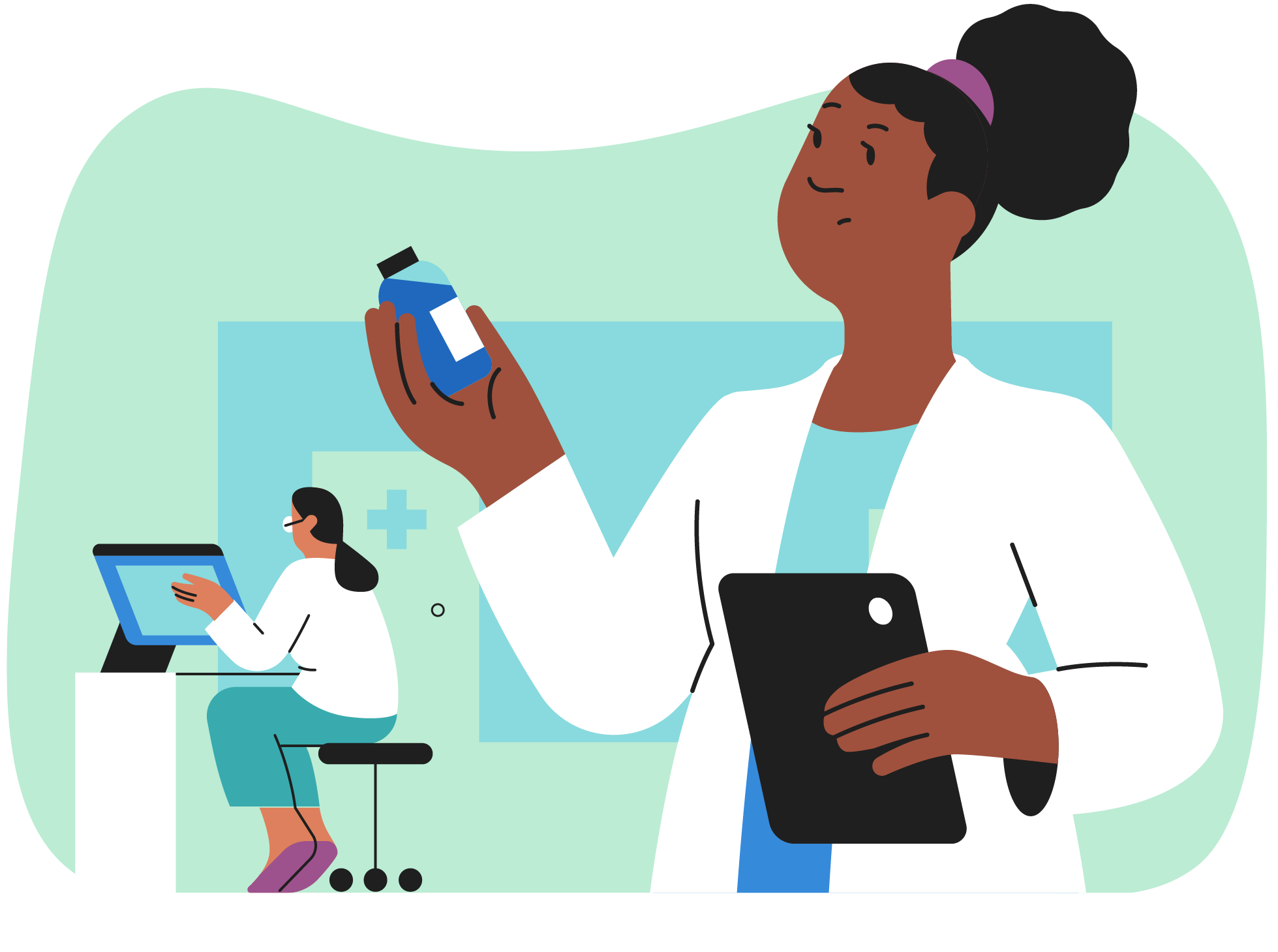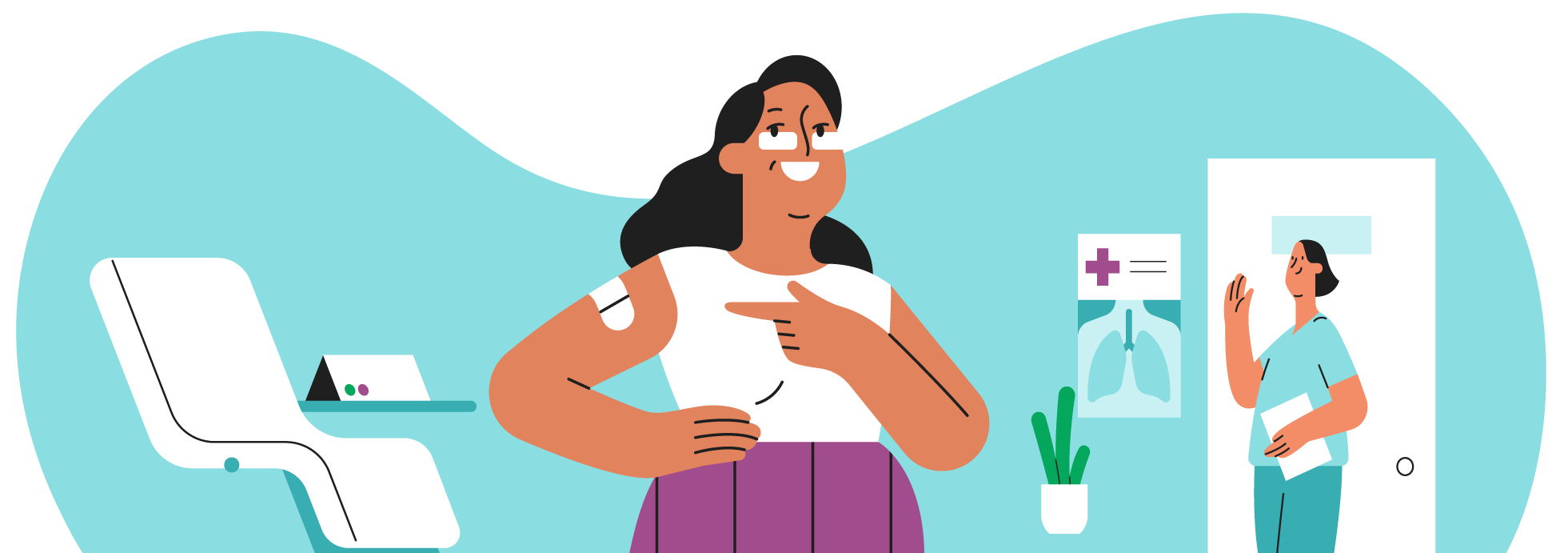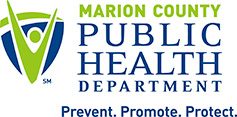Prevent the worries you can with COVID, flu, and RSV vaccines.
Everyday life can be stressful. But protecting yourself and your family against COVID, flu, and RSV is a simple way to take three concerns off your mind.

Glossary
COVID:
What COVID is: COVID is a contagious disease that spreads when an infected person breathes out droplets or particles that contain the COVID virus, and those droplets or particles are breathed in or otherwise absorbed by another person. Symptoms caused by COVID typically include a sore throat, a runny nose, or coughing, but they can also include fatigue, headaches, or body aches. The disease can cause people to become severely ill or even die.
What the COVID vaccine does: COVID vaccines help your body develop immunity to the virus. Although getting the COVID vaccine does not guarantee that you will not get COVID, it will help prevent you from becoming seriously ill or dying if you do get the disease.
FLU:
What flu is: Flu, like COVID, is a contagious disease that may be spread when an infected person breathes out droplets or particles that contain the virus, and those droplets or particles are breathed in or otherwise absorbed by another person. Transmission mostly occurs between fall and spring. Flu can infect the nose, the throat, and sometimes the lungs. Symptoms caused by flu can include fever, coughing, a sore throat, a runny nose, headaches, or body aches. The disease can cause mild to severe illness, and occasionally results in death.
What the flu vaccine does: A flu vaccine can lower your risk of getting the flu. It can also lower the risk of becoming seriously ill from the flu, if you do get it.
RSV:
What RSV is: RSV is a common respiratory virus that spreads through coughing, sneezing, physical contact, and contaminated surfaces. Transmission mostly occurs between fall and winter. Though symptoms are usually mild in most healthy adults, RSV in some infants and older adults can cause lung infections and breathing troubles, which can require hospitalization.
What the RSV vaccine does: For older adults, the RSV vaccine can help reduce the likelihood of developing lung infections and breathing troubles from RSV. The CDC recommends an RSV vaccine for all adults 75 years and older, and also for adults ages 60–74 if they have a chronic heart or lung disease, have a weakened immune system, have severe obesity or diabetes, or live in a nursing home or other long-term care facility.
Immunization against RSV is also helpful for babies and young children. Although the virus is common in childhood (nearly all children get an RSV infection by the time they are two years old) and is usually accompanied by mild, cold-like symptoms, it can also cause more severe illnesses (such as bronchiolitis or pneumonia) that require hospitalization.
To protect your baby from getting very sick with RSV, the Centers for Disease Control and Prevention (CDC) suggests an RSV immunization for infants and some older babies, especially if their mother did not receive an RSV vaccine during pregnancy. More information is available on the CDC website.
Find a COVID, flu, and RSV vaccine provider near you.
Click below to find the locations and hours of the clinics closest to you. For additional vaccine locations, visit vaccines.gov, text your zip code to 438829, or call 1-800-232-0233.
The Marion County Public Health Department offices listed below offer COVID, flu, and RSV vaccines by appointment only. Appointments can be made by calling the number for the clinic you want to visit. Hours for district clinics (Northeast District Health Office, Northwest District Health Office, South District Health Office, and Eagledale Clinic) may be found at MarionHealth.org/immunize or by calling (317) 221-2122.
- Northeast District Health Office
6042 E. 21st Street
(317) 221-7300 - Northwest District Health Office
6940 N. Michigan Road
(317) 221-7500 - South District Health Office
7551 S. Shelby Street
(317) 221-5700 - Eagledale Clinic
2802 Lafayette Road, Suite 13
(317) 221-7500 - ACTION Health Center
2628 N. Pennsylvania Street
(317) 221-3400 - Frank Johnson, Jr. MD Building
3901 Meadows Drive,
(317) 221-3355
The Marion County Public Health Department offers the COVID and flu vaccines on a walk-in basis for ages 12 and older at these Indianapolis Public Library branch locations:
Monday — Closed
Tuesday, Thursday, and Friday 10 a.m.-3 p.m.
Wednesday 10 am-6 pm
- College Avenue Branch – 4180 N. College Avenue
Friday 10 a.m.-3 p.m.
- Garfield Park Branch Library – 2502 Shelby Street (mobile unit)
COVID and flu vaccines are available on a walk-in basis for ages 12 and older at the IndyGo Carson Transit Center, 201 E. Washington Street, each Tuesday and Thursday from 10 a.m. to 3 p.m., and each Wednesday from 10 a.m. to 4 p.m.
Visit vaccines.gov to search for additional vaccine clinic locations in or near your community.
What do I need to bring with me to the clinic?
If you have already received at least one dose of a COVID vaccine
Please bring the COVID Vaccination Record Card that was given to you then. If you need to obtain a vaccination certificate, you can get one through Access Indiana. (If you don’t already have an Access Indiana account, you will need to create one.)
If you can’t find your COVID Vaccination Record Card, and don’t have access to the internet, we can look your card up for you when you come in for your shots.
Insurance cards
If you have an insurance card, we’d like you to bring it. But it’s not necessary. If you don’t have insurance, we want you to come anyway.
Children 6 months to 15 years old
If a child 6 months to 15 years old is coming, they’ll need to bring an adult with them. If that adult is not their parent or guardian, consent from a parent or guardian must be submitted in advance.
Children aged 16 or 17 years old
Ideally, children aged 16 or 17 will also bring a parent or guardian with them. But if that’s not possible, a parent or guardian may provide written or verbal authorization.

What are the updated COVID vaccines?
There are currently three updated COVID vaccines approved or authorized in the United States, and all can help prevent people from getting seriously ill, being hospitalized, or dying. None of the updated COVID vaccines are preferred over another.
- Pfizer-BioNTech
- Moderna
- Novavax
Check the information below to keep yourself and your family up to date with COVID vaccines.
As the COVID virus has evolved, COVID vaccines have been updated to protect against the virus’s variants and to help reduce the risk of severe illness, hospitalization, or death.
People aged 6 months to 4 years who have not received a COVID vaccine before.
Pfizer-BioNTech
1st Dose:
Pfizer-BioNTech
UPDATED VACCINE
2nd Dose:
Pfizer-BioNTech
UPDATED VACCINE
3–8 weeks after 1st dose
3rd Dose:
Pfizer-BioNTech
UPDATED VACCINE
At least 8 weeks after 2nd dose
NOTE: Children this age may receive Moderna vaccines after the first Pfizer – BioNTech vaccine in some situations.
Moderna
1st Dose:
Moderna
UPDATED VACCINE
2nd Dose:
Moderna
UPDATED VACCINE
4–8 weeks after 1st dose
NOTE: Children this age may receive Pfizer-BioNTech vaccines after the first Moderna vaccine in some situations.
People aged 6 months to 4 years who received COVID vaccines before September 12, 2023 should get one or two doses of updated COVID vaccine (depending on what vaccine they got previously and how many doses they received).
Pfizer-BioNTech
If your child has received one previous dose of a COVID vaccine
2nd Dose:
Pfizer-BioNTech
UPDATED VACCINE
3–8 weeks after 1st dose
3rd Dose:
Pfizer-BioNTech
UPDATED VACCINE
At least 8 weeks after 2nd dose
If your child has received two or more previous doses of a COVID vaccine
1st Dose:
Pfizer-BioNTech
UPDATED VACCINE
At least 8 weeks after the last dose
NOTE: Children this age may receive Moderna vaccines after the first Pfizer-BioNTech vaccine in some situations.
Moderna
If your child has received one previous dose of a COVID vaccine
1st Dose:
Moderna
UPDATED VACCINE
4–8 weeks after the last dose
If your child has received two or more previous doses of a COVID vaccine
1st Dose:
Moderna
UPDATED VACCINE
At least 8 weeks after the last dose
NOTE: Children this age may receive Pfizer – BioNTech vaccines after the first Moderna vaccine in some situations.
People aged 5 to 11 years—whether they have not been vaccinated before, or whether they have received one or more previous doses of a COVID vaccine before September 12, 2023—should get 1 updated COVID vaccine: either Pfizer-BioNTech or Moderna.
People aged 12 years and older who have not received a COVID vaccine before
People aged 12 years and older who have not been vaccinated before should get either 1 updated Pfizer-BioNTech or updated Moderna COVID vaccine, OR 2 doses of updated Novavax COVID vaccine.
Pfizer-BioNTech
1st Dose:
Pfizer-BioNTech
UPDATED VACCINE
Moderna
1st Dose:
Moderna
UPDATED VACCINE
Novavax
1st Dose:
Novavax
UPDATED VACCINE
2nd Dose:
Novavax
UPDATED VACCINE
3–8 weeks after 1st dose
People aged 12 years and older who received a Pfizer-BioNTech or Moderna COVID vaccine before September 12, 2023, or a Novavax COVID vaccine before October 3, 2023, should get 1 updated Pfizer-BioNTech, Moderna, or Novavax COVID vaccine.
People aged 65 years and older who have not received a COVID vaccine before and wish to get the Novavax vaccine should get 2 doses of updated Novavax vaccine, followed by 1 additional dose of any updated 2023–2024 COVID vaccine to be up to date.
People who are moderately or severely immunocompromised (have a weakened immune system) need at least 1 dose of a 2023–2024 updated COVID vaccine, but have special recommendations from the CDC, and should ask their healthcare provider about getting additional doses.
Should you mix vaccines?
According to the CDC, COVID vaccine doses from the same manufacturer should be administered whenever recommended. In the following circumstances, an age-appropriate COVID vaccine from a different manufacturer may be administered:
• Same vaccine not available at the vaccination site at the time of the clinic visit
• Previous dose unknown
• Person would otherwise not receive a recommended vaccine dose
• Person starts but is unable to complete a vaccination series with the same COVID vaccine do to a contraindication
For more information, visit this CDC page.
Keep up with future CDC recommendations.
The most recent version of this page was built in July 2024, using information from the CDC website, which is regularly updated to offer the most current information available. In the fall of 2024, newer vaccines are expected to be available. At that time, the CDC page will be refreshed, and recommendations may change. If you’re reading this page after the fall of 2024, we strongly suggest you visit this CDC page to get the most up-to-date information on the latest COVID vaccines.

Below are answers to questions you may have if you:
Aren’t sure about the COVID vaccine yet
Vaccine ingredients vary by manufacturer. None of the vaccines contain eggs, gelatin, latex, or preservatives. All COVID vaccines are free from metals, such as iron, nickel, cobalt, lithium, and rare earth alloys. They are also free from manufactured products such as microelectronics, electrodes, carbon nanotubes, and nanowire semiconductors. None of the COVID vaccines authorized or approved in the United States contain any live virus.
That’s hard to predict because effects vary from person to person. Some people have no side effects at all. Other people experience symptoms that can include sore arms, a mild fever, or a rash. But all those side effects typically disappear within a few days (and they’re proof that your body is building antibodies to fight future illness). In any case, a day or two of mild discomfort is better than suffering through a week or more of COVID.
Yes. Children 6 months and older are eligible for a COVID vaccination. Please see the table earlier on this page for primary series and boosters suggested for different age groups.
Yes. An adult must accompany children 6 months to 15 years old to any vaccine appointment. If the adult present is not the child’s parent or guardian, consent must be submitted in advance.
It’s also preferred that a parent or guardian accompany children aged 16 or 17—but if this is not possible, the parent or guardian can provide written or verbal authorization.
Yes. People who already had COVID and do not get vaccinated after their recovery are actually more likely to get COVID again than those who get vaccinated after their recovery.
Even if you’re in great shape, you should still get vaccinated. For the best protection, the CDC recommends that anyone over the age of 6 months get vaccinated against COVID. Remember, this vaccination doesn’t just protect you. It can help protect your family, friends and loved ones, too.
Aren’t sure whether you need a flu shot
The flu kills tens of thousands of Americans every year and many more people are hospitalized. This year’s flu season is shaping up to be the worst in over a decade. Symptoms of the flu include: fever, cough, sore throat, runny or stuffy nose, and body aches. Some people may have vomiting and diarrhea, though those are more common in children. Even if you happen to get a mild case, it’s no fun.
It’s never too late. Typically, the CDC recommends getting your flu shot in September or October for the best protection throughout flu season. But vaccination after October still provides important protection as flu season peaks.
No. A flu vaccine contains an inactive virus, which teaches your body to produce antibodies. So in case you actually do catch the flu later, you’ll have antibodies ready to fight the disease.
No, flu shots are not dangerous at any stage of pregnancy. In fact, they’re more important than ever. Pregnant women have weakened immune systems, and a shot can offer more protection.
Aren’t sure whether you need an RSV shot
RSV shots are a good idea for anyone 60 years of age or older, pregnant people, adults who have certain risk factors, like lung or cardiovascular illness, and children 19 months or younger who have medical conditions that put them at high risk. Adults receive a vaccine, and young children receive monoclonal antibodies, which instead of stimulating the immune system like a vaccine, introduce antibodies that fight RSV.
RSV symptoms are a lot like cold symptoms, and they usually disappear in a week or two. But RSV leads to more than 2 million doctor visits and 80,000 hospitalizations per year. It is especially dangerous for people 65 or older, leading to as many as 10,000 deaths per year.
RSV season starts in the fall and lasts through winter, so it’s best to get your shot in late summer or early fall before the season starts. Unlike flu shots, which you should get every year, the RSV vaccine protects against the disease for two years.
Side effects are usually mild and include fatigue, fever, headache, muscle or joint pain, nausea, and diarrhea. For a small number of people who took part in clinical trials, serious neurologic conditions developed after they were vaccinated. This early data arose from the first season RSV vaccines were available and a link to neurological disorders is still being studied.
Feel nervous about getting COVID, flu, and RSV shots at the same time
According to this CDC page, studies and clinical trials indicate that getting your COVID vaccine and flu shot at the same time is safe – and saves you time at the clinic.
Studies have shown that getting COVID and flu shots at the same time is safe, and getting flu and RSV shots has been found safe in clinical trials. No research has been conducted so far about the safety of having all three vaccines at one time.
Are an immigrant or person of color in the Indianapolis community
In the past, the government hasn’t always made it easy for immigrants and people of color to get access to good health care. Some neighborhoods have had few pharmacies. Others have had none.
Today, we’re working to bring health care to every person, in every neighborhood. That’s what this effort is all about. We want to change health outcomes for the entire community.
Finally, the seemingly quick development of the first COVID vaccines in 2020 made some people believe that they were rushed. Four years later, there has been ample time to prove vaccines’ effectiveness—and scientists have worked hard to make the updated vaccines more effective than ever against the virus’s new variants.
Yes. The CDC has stated that COVID vaccines are available to anyone—including undocumented immigrants—regardless of their citizenship status.
Yes. Federal law and civil rights protections ensure that people with limited English language skills are entitled to interpretation or translation services to help them communicate with healthcare providers receiving federal funding.
We can’t say for sure. Some providers might. But even if they do, the federal Health Resources & Services Administration states that no one is required to provide identification to get vaccinated for COVID. The CDC has also stated that, since vaccines are now widely available, proof of state residency is not required for vaccination.
If a provider insists that you must show identification, we suggest you leave and find another vaccine clinic near you. If you suspect that federal health policies are being violated, you can submit a complaint to the U.S. Department of Health and Human Services’ Office of the Inspector General.

The sooner you act, the sooner you’ll be protected against COVID, flu, and RSV.
If you need assistance scheduling an appointment at a MCPHD location, please call
MCPHD’s appointment assistance team between 8:30 a.m. and 3:30 p.m. at
(317) 460-5807 or (317) 460-9649.


